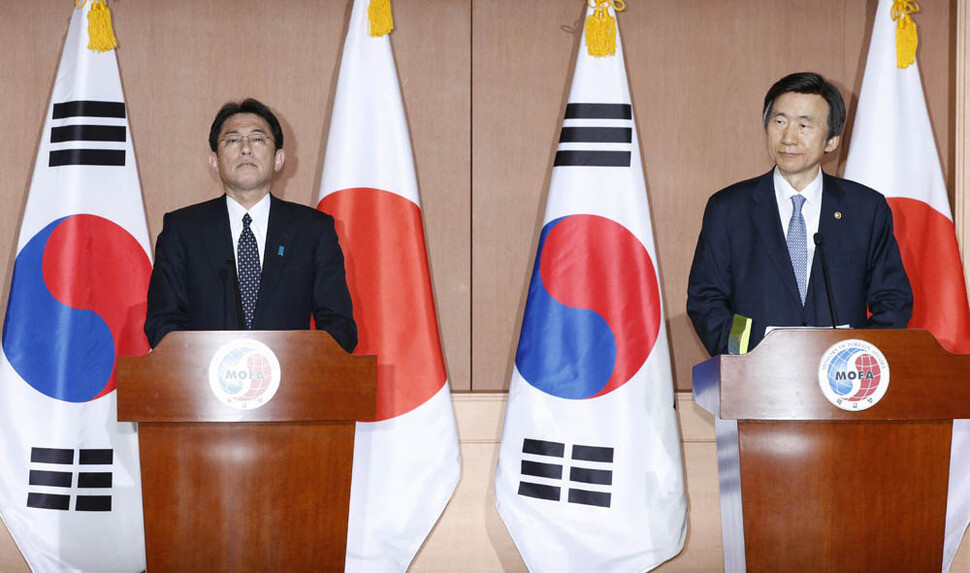hankyoreh
Links to other country sites 다른 나라 사이트 링크
Foreign Minister was denied more time to negotiate comfort women agreement

President Park Geun-hye refused a request from Minister of Foreign Affairs Yun Byung-se for three months’ more negotiation time in connection with the Dec. 2015 agreement with Tokyo on the comfort women issue, it was belatedly learned.
Yun was the minister in charge of the negotiations, which resulted in an agreement announced on Dec. 28 of last year. While some claimed at the time that the Blue House took the initiative in the agreement, this marks the first time a witness claimed the minister effectively opposed a deal and proclamation under the current terms.
“Yun Byung-se told the President, ‘Give me just three months and I’ll get a better agreement,’ but his request was turned down,” a key administration source familiar with the agreement’s negotiation and signing process said on Nov. 21.
“I have no idea why the President didn’t accept Yun’s request for more negotiations, or why she ordered the signing and announcement of the Dec. 28 agreement to go ahead,” the source added.
Another administration source confirmed, “It is true that Yun Byung-se was against concluding and announcing the negotiations under the current terms of the Dec. 28 agreement.”
The accounts suggest Park unilaterally pushed for the agreement’s signing and announcement even after the Cabinet minister in charge deemed it inadequate. With Seoul and Tokyo remaining at odds over how to interpret the agreement since its signing - and with more than half the South Korean public supporting renegotiation - the revelation is expected to have major repercussions.
“That’s the first I’ve heard of anything like that,” said a Ministry of Foreign Affairs official of the claims. But the situation just before the agreement was reached suggests some unseen hand at work against diplomatic authorities’ conclusion that further negotiation was needed. Following an eleventh round of bilateral discussions on the comfort women issue between director-general level officials in Tokyo on Dec. 15 of last year, a ministry official hinted that a deal might not be reachable within 2015.
“It seems like it might be difficult to have [the next discussions] this year,” the official said at the time.
Immediately after that, a de facto deal was reportedly reached in closed-door negotiations between then Presidential Chief of Staff Lee Byung-kee and Japanese National Security Advisor Shotaro Yachi.
The negative effects from the announcement - made in the form of a press conference by the two sides’ Foreign Ministers without regard for the agencies‘ and Minister in charge’s opinion, or even an official agreement text - have been numerous. Japanese Prime Minister Shinzo Abe has yet to mention the words “apology” or “remorse” in public since just after the agreement was reached. Indeed, his attitude on the issue has only become more inflexible, as with his remarks before the House of Representatives Budget Committee on Oct. 3 declaring he did “not have the slightest intention” of complying with Seoul‘s back-channel demands for a letter of apology to the elderly comfort woman survivors.
By Lee Je-hun, staff reporter
Please direct questions or comments to [english@hani.co.kr]

Editorial・opinion
![[Column] Park Geun-hye déjà vu in Yoon Suk-yeol [Column] Park Geun-hye déjà vu in Yoon Suk-yeol](https://flexible.img.hani.co.kr/flexible/normal/500/300/imgdb/original/2024/0424/651713945113788.jpg) [Column] Park Geun-hye déjà vu in Yoon Suk-yeol
[Column] Park Geun-hye déjà vu in Yoon Suk-yeol![[Editorial] New weight of N. Korea’s nuclear threats makes dialogue all the more urgent [Editorial] New weight of N. Korea’s nuclear threats makes dialogue all the more urgent](https://flexible.img.hani.co.kr/flexible/normal/500/300/imgdb/original/2024/0424/7317139454662664.jpg) [Editorial] New weight of N. Korea’s nuclear threats makes dialogue all the more urgent
[Editorial] New weight of N. Korea’s nuclear threats makes dialogue all the more urgent- [Guest essay] The real reason Korea’s new right wants to dub Rhee a founding father
- [Column] ‘Choson’: Is it time we start referring to N. Korea in its own terms?
- [Editorial] Japan’s rewriting of history with Korea has gone too far
- [Column] The president’s questionable capacity for dialogue
- [Column] Are chaebol firms just pizza pies for families to divvy up as they please?
- [Column] Has Korea, too, crossed the Rubicon on China?
- [Correspondent’s column] In Japan’s alliance with US, echoes of its past alliances with UK
- [Editorial] Does Yoon think the Korean public is wrong?
Most viewed articles
- 1‘We must say no’: Seoul defense chief on Korean, USFK involvement in hypothetical Taiwan crisis
- 2N. Korean delegation’s trip to Iran shows how Pyongyang is leveraging ties with Moscow
- 3[Column] Park Geun-hye déjà vu in Yoon Suk-yeol
- 4Amnesty notes ‘erosion’ of freedom of expression in Korea in annual human rights report
- 5‘Weddingflation’ breaks the bank for Korean couples-to-be
- 646% of cases of violence against women in Korea perpetrated by intimate partner, study finds
- 7[Reportage] On US campuses, student risk arrest as they call for divestment from Israel
- 8“Parental care contracts” increasingly common in South Korea
- 9[Interview] Dear Korean men, It’s OK to admit you’re not always strong
- 10Korean government’s compromise plan for medical reform swiftly rejected by doctors